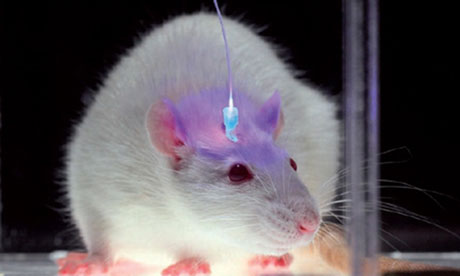Andrew Anglin
Daily Stormer
September 25, 2013

According to a report in the Guardian, published on September 22, entitled “Changing brains: why neuroscience is ending the Prozac era,” the Jewish dominated pseudo-scientific industry of psychiatry is preparing to upgrade its procedure of mass-manipulation of the public through the restructuring of their neurobiology from the prescribing of dangerous, psychosis-inducing mind-altering drugs to direct electronic manipulation of the neural pathways of the brain.
The article begins by praising the Prozac era, before declaring it is coming to an end shortly, due to advancements in the science of neurology which have allowed scientists to permanently alter the neural pathways of lab animals and human guinea pigs by implanting electrodes in their brains.
From the report:
The idea is that we can better understand complex human emotion and behaviour by understanding neural networks. This is where a new wave of interest is beginning to rise within neuroscience. The surge of interest is not with the concepts, which, if truth be told, became common currency in the mid-20th century, but in the extent to which research and treatment are being driven by a desire to identify and modify key brain circuits.
Big money has already been committed. The Obama White House has promised $3bn to develop technology to help identify brain circuits, while the National Institute of Mental Health has promised to move its seven-figure funding away from research into conditions such as schizophrenia and depression towards a system that looks at how brain networks contribute to difficulties that are shared across diagnoses. This project, given the unspectacular name Research Domain Criteria or the RDoC Project, is being cited as an eventual replacement for the diagnostic system used by current-day psychiatrists.
Perhaps more surprising for some is the explosion in deep brain stimulation procedures, where electrodes are implanted in the brains of patients to alter electronically the activity in specific neural circuits. Medtronic, just one of the manufacturers of these devices, claims that its stimulators have been used in more than 100,000 patients. Most of these involve well-tested and validated treatments for Parkinson’s disease, but increasingly they are being trialled for a wider range of problems. Recent studies have examined direct brain stimulation for treating pain, epilepsy, eating disorders, addiction, controlling aggression, enhancing memory and for intervening in a range of other behavioural problems.
Even more bizarre procedures are now ready for human testing:
New technologies such as optogenetics suggest that even finer control of brain circuits may be possible. While deep brain stimulation involves stimulating the brain with electrical currents, optogenetics involves injecting neurons with a benign virus that contains the genetic information for light-sensitive proteins. The brain cells then become light sensitive themselves and their activity can be controlled with millisecond flashes of light sent through embedded fibre optic cables. Until now, this has only been demonstrated in animals but there are high hopes that it could lead to precisely controlled treatments in humans that intervene only in carefully selected brain circuits.
This is, without question, frightening, representing a major milestone in the continuing process of destroying everything that it means to be human, and replacing it with something which better serves the out of control system of materialist-driven capitalism.
The article ends with a declaration that this will lead to an age of post-human existence:
Let’s make this clear. The scientific revolution in identifying and manipulating brain circuits is already under way. Additionally, with billions committed to research over the next 10 years, the medical revolution is likely to follow in the decades after. But a more important change will occur. Advances in neuroscience are not just discoveries, they also shape, as they always have done, how we view ourselves. As the Prozac nation fades, the empire of the circuit-based human will rise, probably to the point where dinner party chatter will include the misplaced jargon of systems neuroscience. But these are tools to help us understand humanity, not our humanity itself. Grief remains the loss of a loved one, joy a fulfilment of life’s desires, and neither could be explained just by neural circuits. Life will still stretch beyond the confines of our inner worlds.
Things just keep getting weirder.
